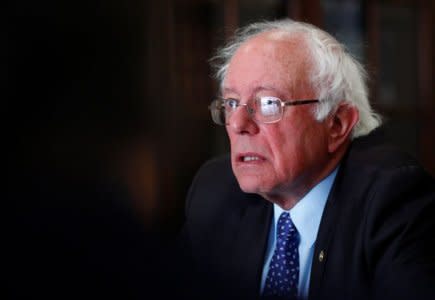Instead of midterm elections, Sanders focuses on local, state races

Thomson Reuters
By Amanda Becker and Richard Cowan
WASHINGTON (Reuters) - Senator Bernie Sanders will focus on getting liberal candidates elected to state and local offices ahead of next year's midterm elections rather than on higher-profile U.S. congressional races, to help build a national progressive movement from the ground up.
Sanders hopes his emphasis on school boards, city councils and statehouses will help support the next generation of activist progressive candidates and dovetail with the mission of Our Revolution, a nonprofit political group run by former staffers and volunteers for his 2016 presidential campaign.
"I look at politics a little bit differently than some of my colleagues in the sense that I believe that we need to build a national grassroots movement," Sanders told Reuters in an interview on Tuesday.
"So I think my emphasis is going to be more on grassroots politics," he added.
Sanders, an independent in the U.S. Senate, galvanized the Democratic Party's progressive wing last year with his primary challenge against eventual nominee Hillary Clinton.
Sanders, 76, drew huge crowds and won 43 percent of Democratic primary voters with his calls to end the influence of big money in politics, create Medicare-for all healthcare and establish free tuition at public universities.
Democrats are arguing over the best way out of a deep electoral rut capped by Clinton's presidential election defeat to Republican Donald Trump. The party lost nearly 1,000 state legislative seats nationally during former President Barack Obama's two terms in the White House, and hold the fewest governor's offices in nearly a century.
Sanders said the type of progressive policies he espoused during his campaign are winning support around the country.
He traveled to Georgia last month to campaign for Vincent Fort, a state senator running for Atlanta mayor. Sanders called Fort, who supports a $15 per hour minimum wage and the expansion of the Medicaid health insurance program for the poor and disabled, a "life-long progressive."
Sanders also pointed to the success of local candidates backed by Our Revolution, including Randall Woodfin, a school board president who triumphed in a crowded field to oust the incumbent Democratic mayor of Birmingham, Alabama, and Chokwe Antar Lumumba, who defeated an incumbent and a state senator to become the Democratic nominee for mayor in Jackson, Mississippi.
Sanders said he plans to travel to Somerville, Massachusetts, next week to support a half dozen candidates in city council races.
"If you look at cities and town and school boards, what you see all over the country is that we are in fact making progress," Sanders said.
While Sanders frequently exasperated Clinton and her supporters, his policy prescriptions won support from many Democrats and the party has shifted to the left since Clinton's defeat. Many potential 2020 Democratic presidential candidates back Sanders' Medicare-for-all proposal.
Republicans hold 52 seats in the 100-member U.S. Senate, and Democrats and independents will be defending 25 of the 34 seats up for re-election in 2018. In the U.S. House of Representatives, Democrats hold 194 of 435 seats and all are up for re-election next year.
The Democratic National Committee and other party organizations have vowed to rebuild from the ground up and focus on drawing new blood into the party.
(Additional reporting by Richard Cowan; Editing by John Whitesides and Alistair Bell)
See Also:

 Yahoo News
Yahoo News 
